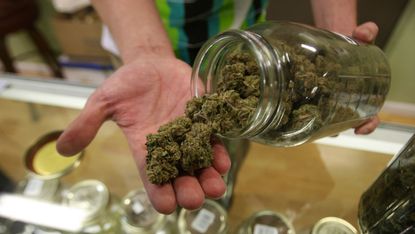Where is cannabis legal?
Malta legalises the drug in European first

Malta is to become the first European country to legalise the growing and possession of cannabis for personal use.
Under the new laws, anyone aged 18 or over will be allowed to possess up to seven grams of the drug without risk of prosecution. Growing up to four cannabis plants at home, and storing up to 50g of the dried product, will also be permitted.
Equality Minister Owen Bonnici, who promoted the bill, said lawmakers had recognised “that the hard-fist approach against cannabis users was disproportionate, unjust and it was rendering a lot of suffering to people who are leading exemplary lives”.
Subscribe to The Week
Escape your echo chamber. Get the facts behind the news, plus analysis from multiple perspectives.

Sign up for The Week's Free Newsletters
From our morning news briefing to a weekly Good News Newsletter, get the best of The Week delivered directly to your inbox.
From our morning news briefing to a weekly Good News Newsletter, get the best of The Week delivered directly to your inbox.
A “wave of change” in attitudes to drug laws is sweeping across Europe, said The Guardian. Malta was “pipping Luxembourg to the post” in becoming the Continent's first country to legalise recreational use.
Luxembourg has approved but not yet implemented legislation to legalise growing cannabis plants, while Germany's new coalition government has pledged to legalise marijuana consumption in licensed stores.
So where, and under what circumstances, is weed already legal?
Personal use
Although there are varying levels of toleration of personal use of the drug, no EU country had legalised cannabis until now, according to the European Monitoring Centre for Drugs and Drug Addiction.
In the following nine EU nations, weed remains illegal, but the law does not allow imprisonment for possession of small quantities of cannabis for personal use only:
- Bulgaria
- Croatia
- Czech Republic
- Ireland
- Italy
- Luxembourg
- Portugal
- Slovenia
- Spain
Holland’s famous “cannabis cafes” are not strictly legal – authorities simply tolerate unlawful acts taking place inside as long as certain conditions are adhered to. The Dutch government says that in most cases where a person is found to have a small amount on their person, or to be growing less than five cannabis plants at home, it is unlikely to lead to prosecution.
Portugal could also be a likely contender to legalise marijuana in the near future. In 2000, the country decriminalised all illicit drugs in an attempt to get to grips with a national heroin crisis. People found using or possessing small quantities of such drugs are sent by police to a “dissuasion commission”, and they may then be fined.
Looking beyond Europe, several countries as well as American states have legalised cannabis in the past decade. Uruguay was the first, in 2013. However some pharmacists encountered a “serious hiccup”, as partnerships with US banks “came under threat”, due to the US’s laws on controlled substances, the BBC reported.
Canada also legalised the drug in October 2018, but the “black market is still vibrant”, The Guardian reported. Retailers have struggled to meet demand, and the quality of the substances on sale is not as high as that from underground sellers, the newspaper continued. Higher prices have also pushed buyers away from legal routes.
The recreational use of marijuana has now been legalised, or is in the process of being legalised, in 18 American states, as well as Washington DC. They are:
- Alaska
- Arizona
- California
- Colorado
- Connecticut
- Illinois
- Maine
- Massachusetts
- Michigan
- Montana
- Nevada
- New Jersey
- New Mexico
- New York
- Oregon
- Vermont
- Virginia
- Washington
Medical use
California legalised marijuana for medical use two decades ago, but no EU nation has followed suit as yet. While smoking cannabis remains illegal in many EU member states, Sativex, a cannabis extract also known as nabiximols, is an authorised medicine in many, as well as the UK. Prescribing medical cannabis in the UK became legal in 2018, with three CBD-derived treatments now licensed for use on the NHS.
In a study on the use of medical cannabis for chronic pain published in the British Medical Journal this year, researchers found evidence that the drug led to improved pain relief, physical functioning and sleep quality in patients. However, at present medical cannabis is only available “for three rare types of childhood epilepsy, the vomiting and nausea associated with chemotherapy and multiple sclerosis-related spasticity”, The Guardian explained.
Other European countries that permit the use of cannabis, or cannabis-derived drugs, for medical reasons include:
- Austria
- Belgium
- Croatia
- Cyprus
- Czech Republic
- Denmark (not yet law, prescription permitted under an extended medical trial)
- Estonia (with a permit)
- Finland
- France
- Germany
- Ireland
- Italy
- Lithuania
- Luxembourg
- Norway
- Poland
- Portugal
- San Marino
- Slovenia
- Spain
- Switzerland
Beyond Europe, the medical use of the drug is permitted in New Zealand and Australia, as well as Jamaica, Barbados, Bermuda, Canada, Chile, Colombia, Ecuador, Israel, Lebanon, Malawi and Mexico, Morocco, Peru, Rwanda, St Vincent, South Africa, Sri Lanka, Thailand, Uruguay, Vanuatu, Zambia and Zimbabwe.
In 2017, Lesotho became the first African nation to legalise the growing of medical cannabis. Though recreational use or possession of the drug remains illegal, a medical cannabis producer, MG Health, was granted a licence earlier this year to begin exporting to the EU. “The company is optimistic accreditation will open doors to business with more EU countries and other international markets”, The Guardian reported, bringing significant employment opportunities to the “tiny mountain kingdom”.
Greece has similarly looked at medical cannabis for economic opportunities, seeing the potential financial benefits of legalising marijuana as a partial solution to its economic crisis.
In 2017, then prime minister Alexis Tsipras said he was bringing forward legislation allowing the drug’s use for medical purposes. His successor, Kyriakos Mitsotakis, swiftly granted new licences for growing medical marijuana. The government hope the export business will bring “around €360 million of investment and create up to 2,250 jobs”, reported consultancy firm Prohibition Partners.
According to The Independent, Tsipras said: “From now on, the country is turning its page, as Greece is now included in countries where the delivery of medical cannabis to patients in need is legal.”
Bloomberg reported in November 2017 that the Greek government hoped to put the legislation before parliament by the end of the year, although it has yet to materialise.
The then agriculture minister, Evangelos Apostolou, said growers had already expressed an interest in investing €1.5bn (£1.3bn) into projects to build greenhouse parks for cannabis production in Greece.
However, while many commentators had speculated that smoking weed would be legalised for medical purposes, Apostolou seemed to imply the new laws relate only to Sativex. He said: “Thousands of Greek households with family members suffering from serious illnesses like cancer and Parkinson’s disease will be able to get drugs produced right here, under World Health Organization guidelines.”
Create an account with the same email registered to your subscription to unlock access.
Sign up for Today's Best Articles in your inbox
A free daily email with the biggest news stories of the day – and the best features from TheWeek.com
-
 Today's political cartoons - April 27, 2024
Today's political cartoons - April 27, 2024Cartoons Saturday's cartoons - natural gas, fundraising with Ted Cruz, and more
By The Week US Published
-
 Aid to Ukraine: too little, too late?
Aid to Ukraine: too little, too late?Talking Point House of Representatives finally 'met the moment' but some say it came too late
By The Week UK Published
-
 5 generously funny cartoons on the $60 billion foreign aid package
5 generously funny cartoons on the $60 billion foreign aid packageCartoons Artists take on Republican opposition, aid to Ukraine, and more
By The Week US Published
-
 Narcan is becoming harder to find at drugstores across America
Narcan is becoming harder to find at drugstores across AmericaUnder the Radar The drug, also known as naloxone, reverses the effects of an opioid overdose
By Justin Klawans, The Week US Published
-
 The lows of an unregulated high: Teens are using marijuana alternative delta-8
The lows of an unregulated high: Teens are using marijuana alternative delta-8In the Spotlight More than 1 in 10 high school seniors have reported using the substance, which contains concentrated THC
By Justin Klawans, The Week US Published
-
 Tianeptine: why lawmakers fear a new kind of opioid
Tianeptine: why lawmakers fear a new kind of opioidThe explainer The drug is sold over the counter. And is highly addictive.
By Devika Rao, The Week US Published
-
 The pros and cons of compounding pharmacies
The pros and cons of compounding pharmaciesPros and cons Customizing medications can be lifesaving and also dangerous
By Devika Rao, The Week US Published
-
 How polysubstance abuse is worsening the American opioid crisis
How polysubstance abuse is worsening the American opioid crisisThe Explainer Studies are showing that more Americans are struggling with dependency on multiple substances.
By Theara Coleman, The Week US Published
-
 Kush: the drug destroying young lives in West Africa
Kush: the drug destroying young lives in West AfricaThe Explainer There has been a sharp rise in young addicts in Sierra Leone, Guinea and Liberia
By Flora Neville, The Week UK Published
-
 Magic mushrooms and the mind
Magic mushrooms and the mindThe Explainer A growing number of states and cities are legalizing the use of psychedelic fungi in therapy. Some experts think that’s a big risk.
By The Week US Published
-
 Marijuana use associated with heart attack and stroke
Marijuana use associated with heart attack and strokeSpeed Read Two new studies point to an increased risk of cardiovascular problems
By Devika Rao, The Week US Published